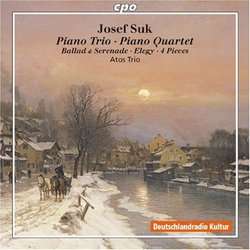| All Artists: Suk, Atos Trio Title: Piano Trio / Piano Quartet Members Wishing: 0 Total Copies: 0 Label: Cpo Records Original Release Date: 1/1/2010 Re-Release Date: 3/30/2010 Genre: Classical Styles: Historical Periods, Classical (c.1770-1830) Number of Discs: 1 SwapaCD Credits: 1 UPC: 761203747023 |
Search - Suk, Atos Trio :: Piano Trio / Piano Quartet
 | Suk, Atos Trio Piano Trio / Piano Quartet Genre: Classical
|
Larger Image |
CD Details |
CD ReviewsMostly Early Chamber Works by Josef Suk J Scott Morrison | Middlebury VT, USA | 04/11/2010 (4 out of 5 stars) "Josef Suk (1874-1935) is, at least outside the Czech ambit, best-known as the son-in-law of Dvorák and the grandfather of his namesake, violinist Josef Suk. He was a competent composer who remained fairly conservative throughout his life. His music is rather Brahmsian, rather Dvorákian. The two main works presented on this disc by the talented Atos Trio (with added violist Martin von der Nahmer in the quartet) are his very early Piano Trio, Op. 2, and Piano Quartet, Op. 1. Both were written when he was in his teens and still a student. Also included here are Four Pieces for Violin and Piano, op. 17, Elegy for Piano Trio, Op. 23, and the Ballade and Serenade. Op. 3. None of these pieces is wholly successful but there are more than enough delectable bits to make hearing the disc worthwhile.
The Piano Trio in C Minor, in spite of its designation as Op. 2, was written before the Piano Quartet, Op. 1. Suk was only fifteen when he wrote it. It is fairly loosely and a bit awkwardly constructed but like all of Suk's subsequent works it brims with lovely melodies and what is interesting is that they do not sound particularly Bohemian. Indeed, the second movement is a habañera! It originally had a scherzo which was suppressed when Suk came back to it in his later teens and it was then published as having three movements. The finale, a whirlwind vivace, is almost Beethovenian. The Piano Quartet in A Minor is the only one of these pieces I've ever heard in concert and it has been recorded a number of times (including once with Suk's grandson playing the violin part). It, too, is in three movements with some sharing of rhythmic and motivic elements among them. It is almost symphonic in its imposing dramatic tone. There are significant solo lines for all three stringed instruments -- I was particularly taken with the rich tone of von der Nahmer's viola -- that occasionally sound as if they come from a concerto. Suk has a tendency once he has found a striking idea to display it just a little too long and that particularly occurs in the finale. Still, it's a pretty remarkable piece for a teenager to write and I'm glad to hear it again after some years. The other works are reasonably minor. The Four Pieces for solo violin and piano is the largest of them, taking seventeen minutes. The musical style is slightly more advanced, borrowing as it does from some impressionistic harmonies and using a rather sparer texture. The violin part is virtuosic but then so is the piano part. In this recording, and indeed in all of the music presented here, the sound of the piano is slightly too forward and at times it almost drowns out the strings, particularly the solo violin in these pieces. Elegy for Piano Trio is an arrangement of a piece for violin and cello soloists, accompanied by string quartet, harmonium and harp written for a memorial for the Bohemian poet Julius Zeyer. It was inspired by Zeyer's 'Vysehrad', a poem about Prague's fortress-castle, the name of which may be familiar to some as one of the pieces in Smetana's 'Ma Vlast'. It is in the cemetery at Vysehrad that such famous Bohemians as Dvorák, Karel Capek and Smetana himself are buried. This six-minute piece (only 70+ measures long) has gorgeous melodies sung by violin and cello. Ballade and Serenade for cello and piano are two separate pieces written some six years apart but published together as Op. 2. The Ballade is both melancholy and dramatic. The Serenade is gently playful and is the only piece here that has, to my ear, any Bohemian tinge. The Atos Trio is a young German group whose Schumann, Schubert & Beethoven disc I admired Atos Trio Plays Beethoven, Schubert & Schumann. They do themselves proud on this disc and because of the nature of the works presented we can hear more soloistic playing by each instrumentalist. Once again, and sadly, the cpo booklet notes by Eckhardt van den Hoogen are full of interesting information but given in his knotted, garrulous and not entirely understandable style, helped not at all by the execrably unidiomatic translation by Susan Marie Praeder. Still I'm glad I have this disc. Scott Morrison" |

 Track Listings (13) - Disc #1
Track Listings (13) - Disc #1